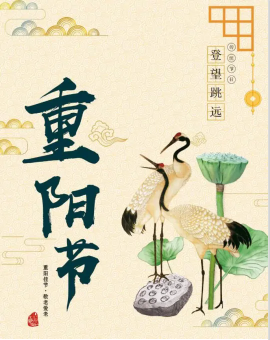Double Ninth Festival
The Double Ninth Festival is a traditional Chinese folk festival that falls on the ninth day of the ninth lunar month every year. The number “Nine” is a yang number in the “Book of Changes”. The two yang numbers “Nine Nine” overlap each other, so it is called “Double Ninth Festival”; because both the sun and the moon coincide with nine, it is also called “Double Nine”. Jiujiu returns to his true nature and the One Yuan begins. The ancients believed that the Double Ninth Festival is an auspicious day. In ancient times, people had customs such as climbing high to pray for blessings, worshiping gods and ancestors, and drinking banquets to pray for longevity during the Double Ninth Festival. It has been passed down to this day, and connotations such as respecting the elderly have been added. Climbing high to appreciate autumn and being grateful and respectful to the elderly are two important themes of today’s Double Ninth Festival activities. [1-5]
The Double Ninth Festival originated from the worship of celestial phenomena. It began in ancient times, became popular in the Western Han Dynasty, and flourished after the Tang Dynasty. According to the existing historical data and textual research, in ancient times, there were activities to hold harvest festivals to worship heaven and ancestors in the autumn season; the ancients held sacrifices to the emperor of heaven and ancestors in September when crops were harvested, in order to thank the emperor of heaven and ancestors for their kindness. This is the Double Ninth Festival as an autumn festival. The original form existed for harvest ritual activities. The Tang Dynasty was an important period when traditional festival customs were integrated and finalized, and the main part of them has been passed down to this day. [4-8]
The Double Ninth Festival has been a mixture of various folk customs in its historical development and evolution, carrying rich cultural connotations. In folk customs, “nine” is the largest number, which means longevity and longevity. It expresses people’s blessings for the elderly’s health and longevity. On May 20, 2006, the Double Ninth Festival was included in the first batch of national intangible cultural heritage lists by the State Council. [1] [9-10] The “Law of the People’s Republic of China on the Protection of the Rights and Interests of the Elderly” revised and passed by the Standing Committee of the National People’s Congress in 2012 stipulates that the ninth day of the ninth lunar month every year is the Senior Citizen’s Day. [11]

